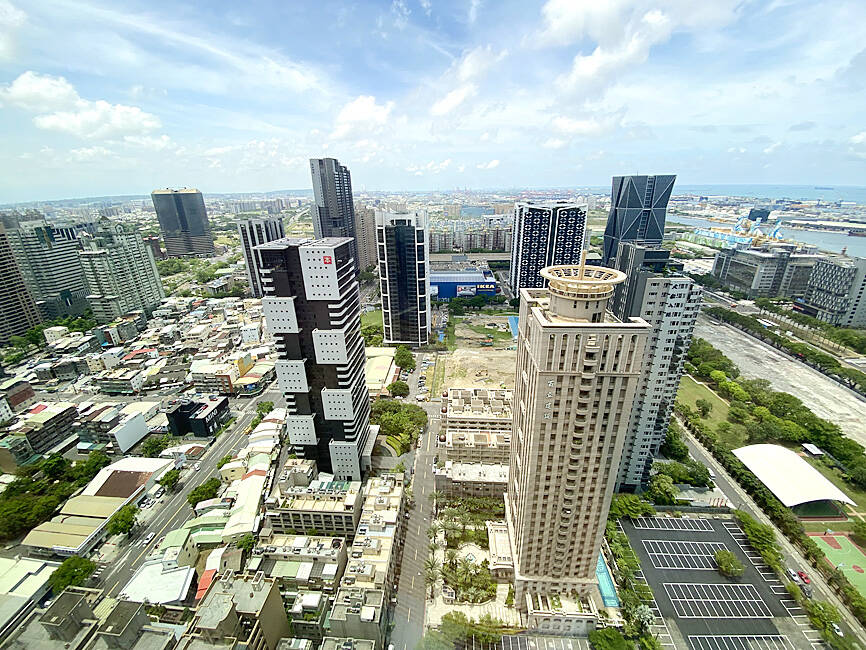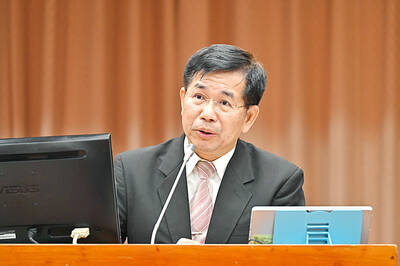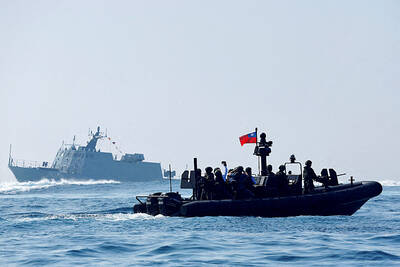The Executive Yuan yesterday approved plans to raise property taxes on multiple homes to between 2 and 4.8 percent, while easing the rate to a flat 1 percent for first self-occupied houses.
The proposed tax hikes, which the Legislative Yuan needs to approve, aim to curb property hoarding in a more uniform and effective fashion, as existing taxes appear inadequate, Minister of Finance Chuang Tsui-yun (莊翠雲) said.
The draft bill states that local governments “must” collect house taxes of 2 percent to 4.8 percent, a change from current clauses that say local administrations “may” impose house taxes of 1.2 percent to 3.6 percent, Chuang said.

Photo: CNA
It is time to revisit the tax a decade after its last revision, as some local governments have been pressing for stronger measures to tackle property hoarding, a practice widely blamed for soaring real-estate prices, Chuang said.
At present, only 10 local governments have discriminatory taxes on fourth homes and real-estate properties for rent. The remaining 12 cities and counties do not have differentiated tax rates.
The bill would also give local governments room to raise the house tax by an additional 30 percent to 6.24 percent as they see fit, the ministry said.
The legal revisions are intended to advance the cause of housing justice rather than inflate state coffers, as they seek to cut the property tax to a flat 1 percent, from 1.2 percent, on first self-occupied houses, the ministry said.
More than 3.28 million houses would benefit from the flat rate and it would cost the national treasury NT$940 million (US$30.11 million) in annual tax losses, it said.
Furthermore, the bill would lower the tax on rental homes to between 1.5 percent and 2.4 percent, from 1.5 percent to 3.6 percent, to motivate multiple-home owners to lease their idle units and boost occupancy rates, it said.
This should help people who cannot buy a home to find affordable units for rent, it said.
To curb tax evasion, the bill would define multiple homes on a nationwide — rather than local — basis.
Local governments have shared the need for the legal change over the years, the minister said, adding that about 360,000 houses would be subject to stiffer property taxes and contribute an additional NT$2.6 billion to the state coffers every year.
A public rally to protest rising housing unaffordability in front of the Presidential Office Building in Taipei is being planned for July 16.
The ministry said it would facilitate the bill’s review in the legislature in the hope that it could be implemented in July next year.

The International Industrial Talents Education Special (INTENSE) Program to attract foreigners to study and work in Taiwan will provide scholarships and a living allowance of up to NT$440,000 per person for two years beginning in August, Minister of Education Pan Wen-chung (潘文忠) told a meeting of the legislature’s Education and Culture Committee yesterday. Pan was giving an update on the program’s implementation, a review of universities’ efforts to recruit international students and promotion of the Taiwan Huayu Bilingual Exchanges of Selected Talent (BEST) program. Each INTENSE Program student would be awarded a scholarship of up to NT$100,000 per year for up to

BASIC OPERATIONS: About half a dozen navy ships from both countries took part in the days-long exercise based on the Code for Unplanned Encounters at Sea An unpublicized joint military exercise between Taiwan and the US in the Pacific Ocean last month was carried out in accordance with an international code, the Ministry of National Defense (MND) said yesterday. According to a Reuters report citing four unnamed sources, the two nations’ navies last month conducted joint drills in the Western Pacific. The drills were not made public at the time, but “about half-a-dozen navy ships from both sides, including frigates and supply and support vessels, participated in the days-long exercises,” Reuters reported, citing the sources. The drills were designed to practice “basic” operations such as communications, refueling and resupplies,

‘MONEY PIT’: The KMT’s more than NT$2 trillion infrastructure project proposals for eastern Taiwan lack professional input and financial transparency, the DPP said The Democratic Progressive Party (DPP) caucus yesterday said it would ask the Executive Yuan to raise a motion to oppose the Chinese Nationalist Party (KMT) caucus’ infrastructure proposals and prepare to file for a constitutional interpretation if the KMT-dominated legislature forces their passage. The DPP caucus described the three infrastructure plans for transportation links to eastern Taiwan proposed by the KMT as “three money pit projects” that would cost more than NT$2 trillion (US$61.72 billion). It would ask the Executive Yuan to oppose public projects that would drain state financial resources, DPP caucus secretary-general Rosalia Wu (吳思瑤) said. It would also file for

SELF-SUFFICIENCY: The project would only be the beginning, as Taiwan needs at least 120 satellites to ensure uninterrupted communication, Wu Tsung-tsong said The Taiwan Space Agency (TASA) yesterday said it plans to launch six low Earth orbit satellites starting in 2026 as part of the government’s plan to boost the resilience of the nation’s communications. The development of the technology gained attention after Ukrainians were able to access the Internet through Space Exploration Technologies Corp (SpaceX) CEO Elon Musk’s Starlink satellite service, despite their infrastructure being severely damaged in the war with Russia. Two of the satellites would be built by the government, while four would involve cooperation between TASA and private contractors. “Over the past 30 years, the satellite technology in Taiwan has